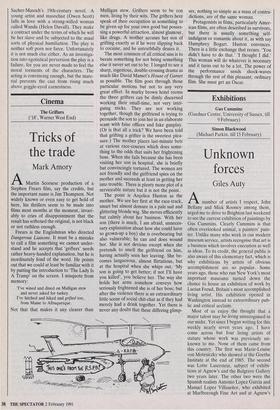Cinema
The Grifters (`18', Warner West End)
Tricks of the trade
Mark Amory
AMartin Scorsese production of a Stephen Frears film, say the credits, but the important name is Jim Thompson. Not widely known or even easy to get hold of here, his thrillers seem to be made into films most months at the moment, invari- ably to cries of disappointment that the result has softened the original, is not black or not ruthless enough.
Frears is the Englishman who directed Dangerous Liaisons. It must be a mistake to call a film something we cannot under- stand and he accepts that `grifters' needs rather heavy-handed explanation, but he is inordinately fond of the word. He points out that we could at least be familiar with it by putting the introduction to 'The Lady Is A Tramp' on the screen. I misquote from memory:
`I've wined and dined on Mulligan stew and never asked for turkey.
I've hitched and hiked and grifted too, from Maine to Albuquerque.
Not that that makes it any clearer than Mulligan stew. Grifters seem to be con men, living by their wits. The grifters here speak of their occupation as something to be given up for your own good but posses- sing a powerful attraction, almost glamour, like drugs. A mother accuses her son of grifting exactly as if he were slipping back to cocaine, and he untruthfully denies it.
The most common of all critical sins is to berate something for not being something else it never set out to be. I longed to see a sharp, ingenious, double-crossing drama as much like David Mamet's House of Games as possible. The film goes through those particular motions but not to any very great effect. In murky brown hotel rooms the three grifters can be dimly discerned working their small-time, not very intri- guing tricks. They are not working together, though the girlfriend is trying to persuade the son to join her in an elaborate scam with false offices and fake gunplay. (Or is that all a trick? We have been told that grifting a grifter is the sweetest plea- sure.) The mother places last-minute bets at various race-courses which does some- thing to the odds that suits her frightening boss. When she fails because she has been visiting her son in hospital, she is briefly but convincingly tortured. The women are not friendly and the girlfriend spies on the mother and succeeds at least in getting her into trouble. There is plenty more plot of a serviceable nature but it is not the point.
The point is Anjelica Huston as the mother. We see her first at the race-track, smart but almost demure in a pale suit and glittering blonde wig. She moves efficiently but calmly about her business. With her son (there is much, I am afraid, unneces- sary explanation about how she could have so grown-up a boy) she is overbearing but also vulnerable; he can and does wound her. She is not devious except when she pretends to smell the girlfriend on him, having actually seen her leaving. She be- comes languorous, almost flirtatious, but at the hospital when she whips out, 'My son is going to get better; if not I'll have you killed', you believe her. The way she holds her arms somehow conveys how seriously frightened she is of her boss; but after the violence there is an extraordinary little scene of social chit-chat as if they had merely had a drink together. Yet there is never any doubt that these differing glimp- ses, nothing so simple as a mass of contra- dictions, are of the same woman.
Protagonists in films, particularly Amer- ican films, are often described as survivors, but there is usually something self- indulgent or romantic about it, as with say Humphrey Bogart. Huston convinces. There is a little exchange that recurs: 'You didn't have to do that.' I thought I did.' This woman will do whatever is necessary and it turns out to be a lot. The power of the performance sends shock-waves through the rest of this pleasant, ordinary film. She must get an Oscar.


















































 Previous page
Previous page